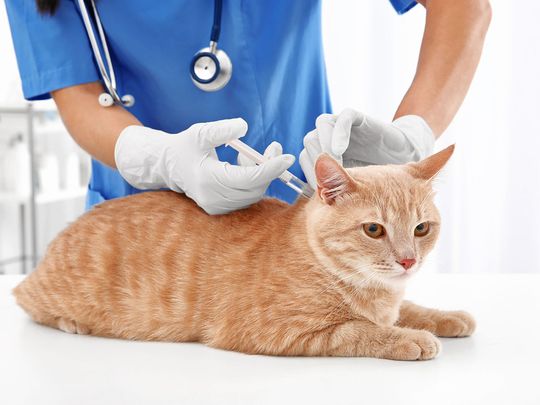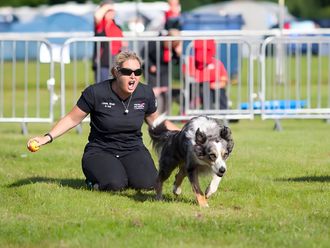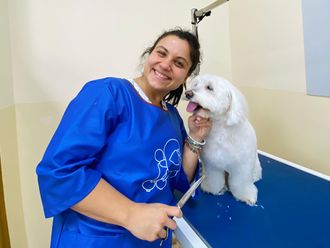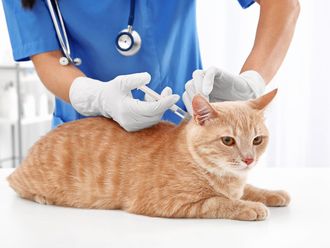
Living in the UAE comes with its own unique challenges, not just for its human residents, but also for their beloved animal companions. From scorching temperatures to the occasional sandstorm, the environment poses various threats to pets’ health and well-being. But fear not, by staying clued in on the common pet pitfalls in the UAE and taking proactive measures, we can keep our four-legged pals living their best lives amidst the heat and sand.
According to Sean Parker, GM and Director of Operations at My Second Home, two of the most concerning diseases for dogs in the UAE are parvovirus and distemper. These highly contagious illnesses can have devastating effects if left untreated. “Parvovirus manifests with symptoms such as foul-smelling projectile diarrhoea, vomiting, extreme lethargy, and loss of appetite,” says Parker. “Distemper, on the other hand, initially presents with pus-like discharge from the eyes, fever, and loss of appetite, but can progress to affect the nervous system, leading to muscle twitches, seizures, and eventually paralysis.”
Another disease that often presents and is highly contagious, but not life threatening, is a parasite known as Giardia. The typical symptoms of Giardia include watery diarrhoea and vomiting.
Importance of vaccination
Dr Nour Fakher, Veterinary Surgeon, Blue Oasis Veterinary Clinic, is concerned about the seriousness of these diseases, and highlights the importance of vaccinations in preventing them. “Distemper, kennel cough, and parvovirus pose significant risks to dogs’ health and can be fatal if not promptly addressed,” she says.
For cat owners, the so-called “cat flu complex” poses a serious concern, as outlined by Dr Fakher. This group of viral infections can cause symptoms such as vomiting, diarrhoea, lethargy, and respiratory issues. Additionally, diseases like Feline Immunodeficiency Virus (FIV) and Feline Infectious Peritonitis (FIP) are particularly deadly, with no available vaccines for prevention.
Dr Uiase Bin Farooq, Senior Surgeon, Vets in the City Veterinary Clinic, draws attention to the environmental challenges faced by pets in the UAE. The hot weather and humidity can lead to issues such as dehydration, heat exhaustion, and skin infections such as ringworm. “Sandstorms exacerbate respiratory problems and can spread diseases like Coccidioidomycosis and Cryptococcosis,” says Dr Farooq. “Indoor living with air conditioning is common in the UAE, but it can also lead to respiratory problems for pets such as dryness and congestion. Fortunately many conditions such as cancers and rabies are uncommon in the UAE.”
Furthermore, Dr Farooq values the role of vaccination in preventing the spread of diseases such as FIV, FeLV, and FIP, which are increasingly prevalent due to the large population of non-vaccinated stray cats. “Rabies is a shared threat dangerous to both humans and pets; however it’s preventable through vaccination,” says Dr Farooq. Additionally, he underscores the importance of protecting pets from parasitic infections, both internal and external, which can cause gastrointestinal issues and skin irritation.

Preventive measures
Vaccination stands as the cornerstone of disease prevention for pets. Parker advises dog owners, especially those with puppies, to undergo a VacciCheck, which assesses the pup’s antibody levels against parvovirus, distemper, and canine hepatitis. Failing the VacciCheck prompts immediate action, including isolation and restarting the vaccination process. Ensuring your pup is adequately vaccinated significantly reduces the risk of contracting these deadly diseases.
“A VacciCheck requires a small amount of blood to be analysed to check for antibodies against parvovirus and distemper,” says Parker. “A pup with antibodies against parvovirus and distemper is highly unlikely to contract the disease. While at the vet for the VacciCheck the pup can also be tested for Giardia. It is extremely prevalent in dogs from breeders and pet stores.”
Dr Fakher echoes the relevance of vaccination, underlining its effectiveness in preventing serious illnesses. “For pet owners in the UAE, understanding disease transmission and adhering to vaccination schedules are paramount,” she says. “Vaccination not only protects individual pets but also contributes to community-wide disease control efforts.”
Talking about the significance of parasite control and hygiene practices in minimising disease risks, Dr Farooq says regular anti-parasitic treatments safeguard pets against internal and external parasites, which are prevalent in the UAE’s warm and humid climate. “Practicing good hygiene, such as cleaning pet living areas and providing fresh food and water, helps prevent the spread of infectious agents,” he says.
The UAE’s extreme heat poses a significant threat to pets, making heat safety practices crucial. Dr Farooq recommends keeping pets cool and hydrated, providing shaded areas, and avoiding strenuous activity during peak temperatures. “Regular grooming not only keeps pets comfortable but also helps prevent skin infections and parasite infestations,” he says.
Regular veterinary care plays a pivotal part in maintaining pet health and detecting illnesses early on. Pet owners are encouraged to schedule routine check-ups, where veterinarians can assess overall health, administer vaccinations, and provide tailored advice for preventive care. “Staying vigilant for any signs of illness, such as vomiting, diarrhoea, lethargy, or changes in behaviour, enables prompt intervention and better treatment outcomes,” says Dr Farooq.
Treatment options
Despite our best efforts in preventive care, pets can still fall victim to illnesses. When prevention isn’t possible, swift action and appropriate treatment become crucial for their well-being.
Parker highlights the severity of parvovirus and distemper, two highly contagious and potentially fatal diseases for dogs. If a pup contracts either of these illnesses, immediate isolation and veterinary intervention are necessary. “Treatment often involves an extended stay in a vet hospital, where a tailored plan is crafted for the pet’s specific needs,” says Parker. “While the prognosis can be guarded, early detection and intensive care improve the chances of survival.”
Dr Fakher says early diagnosis helps in improving the prognosis for pets with serious illnesses. Swift action enables veterinarians to implement appropriate treatment strategies, ranging from medication to supportive care. “While some illnesses can be cured with medication, others require ongoing management to support the pet’s immune system,” says Dr Fakher. “Delays in seeking treatment can lead to dire consequences, underscoring the importance of prompt veterinary attention.”
Giardia, a prevalent parasitic infection in dogs, can cause gastrointestinal distress if left untreated. Parker advises that most veterinarians will prescribe a short course of medication to resolve the infection. “Thorough disinfection of the home environment and the pet’s fur, particularly around the anus, is crucial to prevent reinfection. Your veterinarian will provide specific guidance on effective disinfection methods tailored to your pet’s needs.”
In cases where prevention fails and illness strikes, supporting the pet’s recovery becomes paramount. Dr Fahker stresses on the importance of holistic care, including medication, supportive treatments, and bolstering the pet’s immune system. “Early intervention and proactive management can enhance the pet’s quality of life and increase the likelihood of a favourable outcome,” she says.
Role of regular check-ups
Regular check-ups and vaccinations are vital components of responsible pet ownership, particularly in the unique environmental conditions of the UAE. Parker recommends a VacciCheck every two years as an added layer of protection. The VacciCheck serves as an insurance policy against serious diseases like parvovirus and distemper, providing valuable insights into the effectiveness of vaccinations.
Dr Fakher agrees on the importance of vaccinations. Regular veterinary visits, complete with thorough examinations and blood tests, are essential for early disease detection and better treatment outcomes. Dr Fakher says veterinary care is as fundamental as food and shelter, emphasising the importance of seeking professional advice promptly if pets show signs of illness.













